After pioneering wild camping trips on 17ft ‘Outdoor Girl’ her skipper Debbie decided to build another spritsail yawl at The Boat Building Academy. We named her ‘Wild Boy’ and both boats are fitted out for wild camping and we provide a skipper/local guide to show you the best places and how to sail a spritsail yawl.
You can navigate the shallows, beach the boat to step ashore, row right into small Cornish harbours, follow old sea routes up wooded creeks and far into the shallow salt marsh, anchor in forgotten pools and camp on beaches and shorelines inaccessible by land.
Alternatively a If you want a non camping version, you can learn small boat handling skills on the open boats Wild Boy and Outdoor Girl by day and stay aboard pilot cutter Tallulah as a comfortable ‘mother’ ship (see Tallulah voyages for the 6 day ‘Big Boat – Small Boat’ courses).
Length Overall
20ft
Length On Deck
17ft
Year Built
2008
Vessel Type / Rig
Spritsail Yawl
Guest Berths
1-3
Crew Berths
1
Not everybody has an adventure buddy to do the camping, sailing, fishing thing, and you might not even be sure if you will like it. Luckily we have the boats, a skipper that is ‘up for adventure’ on land and sea, and a perfect location to try it. Whether you are thinking about buying a day boat, building your own one day, or scaling up from sea kayaking, this is a great opportunity to try out the concept on the South Coast of Cornwall.
Join the co-founder of Classic Sailing – Debbie Purser, or one of Tallulah’s regular mates on some small boat sailing expeditions along the South Cornwall coast. Debbie spent 20 years as skipper of pilot cutter Eve of St Mawes – exploring coastal Cornwall and the Isles of Scilly, but also rowing ashore with charter guests to discover some unique secret spots. She is now on a mission to show you the delights of small boat overnight cruising, and share the rich experience with individuals, couples or tiny groups (1-2 people with a skipper). Our regular mates on Tallulah are always keen to skipper the small boats too.
With a resurgence of interest in living off the land, food foraging, bushcraft Debbie wants to make it easy for you to come and try sailing open boats as a way of getting close to nature. On any coastal expedition, she can draw on her wide knowledge of wildlife, the landscape and understanding of what makes the local communities tick. If you want an adventure buddy that can coax you into trying wild swimming or stand up paddle boarding, make camping civilised and rustle up a hot meal on a camping stove, then Debbie is the outdoor companion you need. She also has wide interests, has sailed all over the world, and had several careers, so campfire stories are never dull.
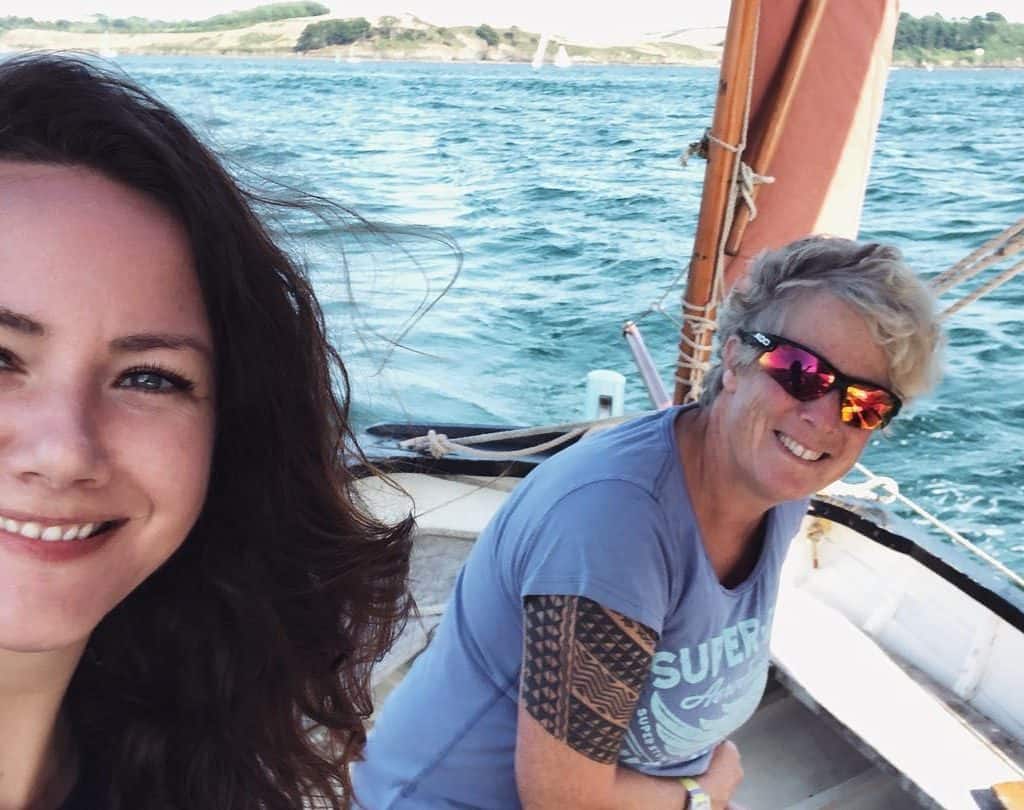
The mini journeys are mainly 2 or 3-day tasters with the boat, instruction, delicious campfire food and modern camping equipment provided.
Neap tides are best for ‘beach to beach’ camping, as there is more dry sand to pitch a tent at the top of beaches and inaccessible coves. The Roseland and Lizard coasts have very few settlements, but even the remote beaches can be popular during the day. There is an art to wild camping without drawing too much attention to ourselves. Historically Falmouth pilot rowing gigs pulled up on beaches overnight on the Lizard coast to rest the crews. Even today sea kayakers and fishermen often use Cornish beaches for camping, We aim for inaccessible coves where possible, or pack up tents early before any early morning dog walkers find us. Don’t overstay your welcome and leave no human trace is all part of the unofficial code for wild camping.
There are also tiny havens amongst the rocks that can work as anchorages in the right wind conditions, where seaweed gatherers might wiggle into with a boat, or fishermen laying crab pots.
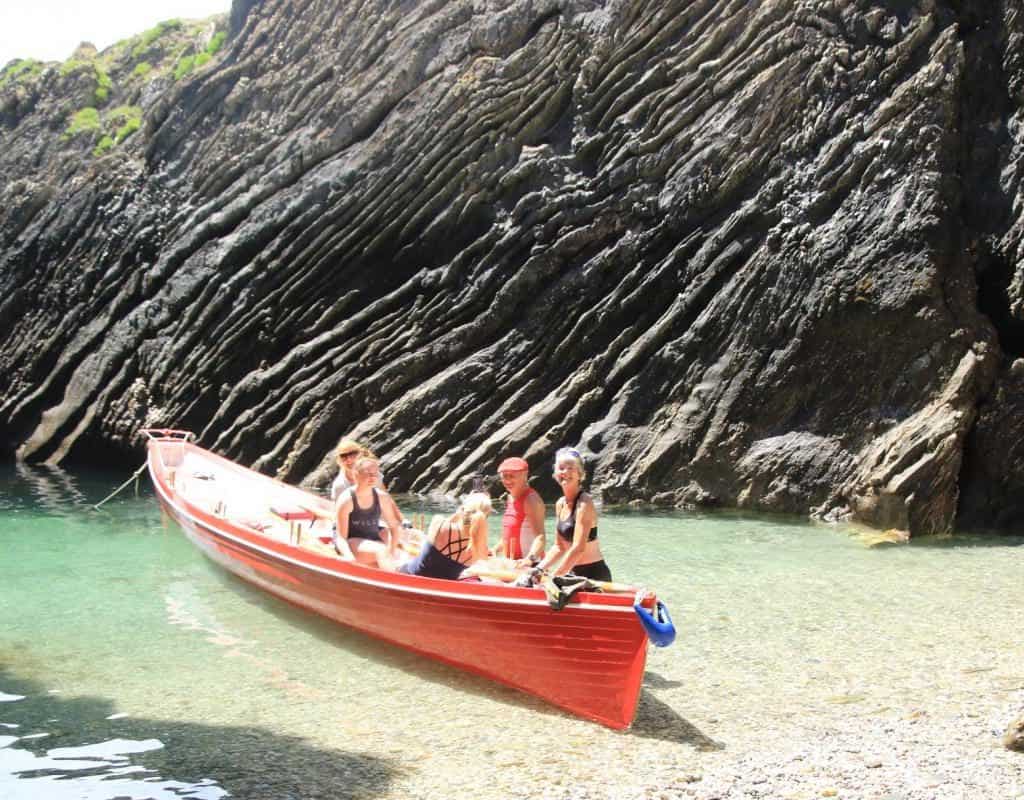
Spring Tides are good for sailing silently up the tidal creeks and in amongst the salt marshes that few sailors see. Camping is clandestine, tucked amongst the trees or afloat in deep water pools where no one can reach us at low water. This is real wild camping as you may have to sleep on board under a boom tent as the shoreline is often steep or private woodland. See parts of Cornwall where ospreys and otters can still be found and herons and egrets nest in the trees.
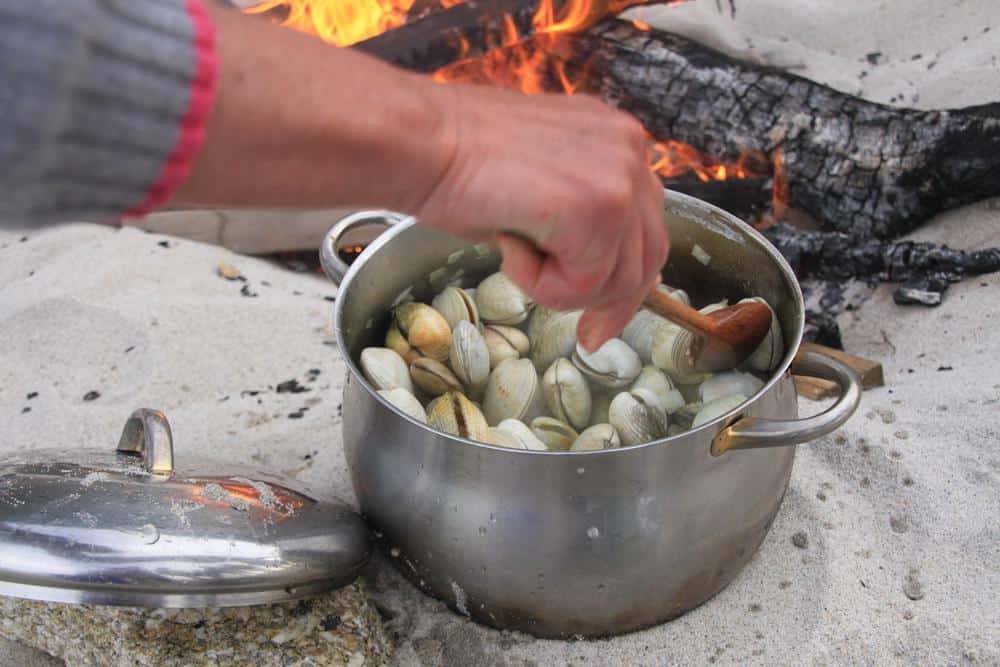
Learning to sail small boats brings the concept of one day owning your own boat into the realms of possibility. It doesn’t really matter if it is a wooden rowing boat or a fibreglass dinghy or Drascombe Longboat, it is the size and affordability that matters. Not only can a small dinghy find quiet anchorages that are close to the shore and the wildlife of the littoral, you can also sail into drying harbours that are unreachable for yachts at low water. There is something rather satisfying about landing for free for a quick pint, ice cream, or shower.
Learning to sail small boats brings the concept of one day owning your own boat into the realms of possibility. It doesn’t really matter if it is a wooden rowing boat or a fibreglass dinghy or Drascombe Longboat, it is the size and affordability that matters. Not only can a small dinghy find quiet anchorages that are close to the shore and the wildlife of the littoral, you can also sail into drying harbours that are unreachable for yachts at low water. There is something rather satisfying about landing for free for a quick pint, ice cream, or shower.
Over the years many charter guests with Classic Sailing have gone on to buy boats. We recognise that few can afford an offshore yacht or pilot cutter, but you can have a lot of fun on smaller second hand boats or dinghies. Mostly it is the creek hopping or coastal day boats that sail past us with past customers grinning with pride. Wild Boy can be a stepping stone or catalyst for your own dreams…. and prove that you can build or restore your own boat too.
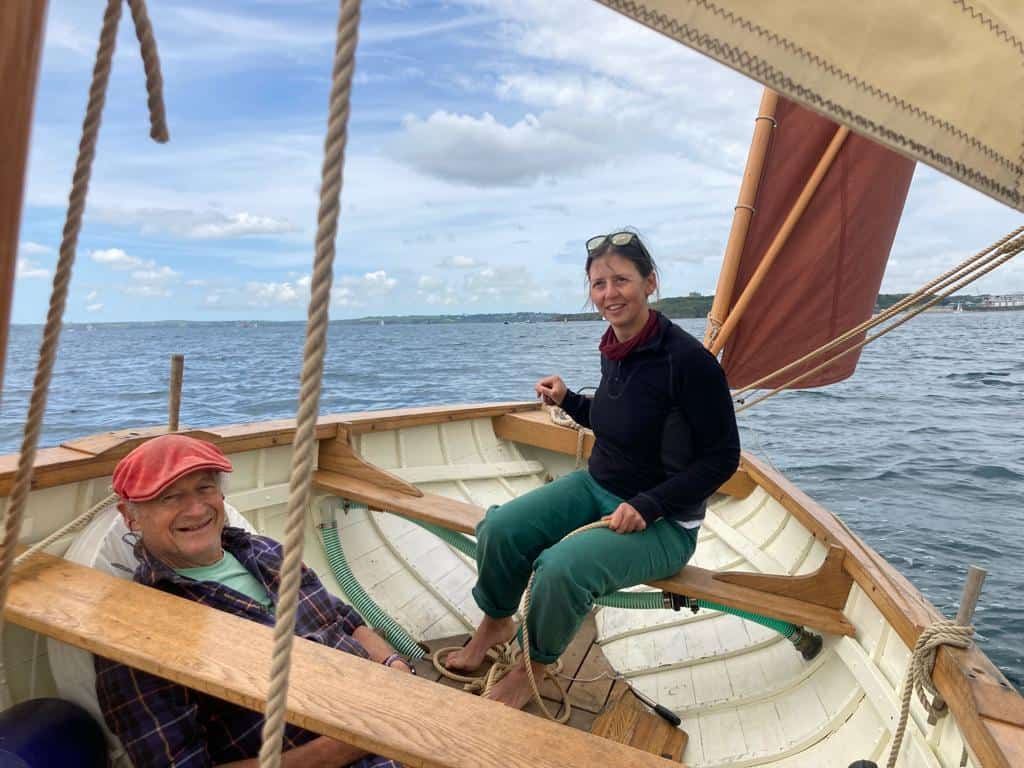
Travelling by small boat using only sail and oar is a fast-growing trend in several countries. It seems a logical rebellion against excessive consumption of fossil fuels to go travelling. The re-connection with nature, health benefits of outdoor physical exercise and the re-learning of practical skills that were once common all around the coasts of Europe is all part of the attraction.
In France, a movement called Voile-Aviron (sail and oar) is sweeping the coastline. People are discovering the delights of sailing simple, traditionally inspired boats, mostly without engines. there is always a French sailor to be found at maritime festivals, standing up proudly sculling like a boatman, when his weekday job is high tech in an office. Voile Aviron rallies can attract crowds of dinghies sailing up a river to an anchorage when boats can raft up for a party or a meal together.
‘Gunkholing’ is a popular activity in USA, where groups of small boats sail to a secluded spot, drag their boats up the beach, erect a tent and light a fire to cook the fish they have caught.
A more competitive type of dinghies cruising together are the small boat ‘Raids‘ that have become popular in Scandinavia and elsewhere. These are typically a race under sail and oar over several days, tackling long distances like the Caledonian Canal or crossing archipelagoes island to island.
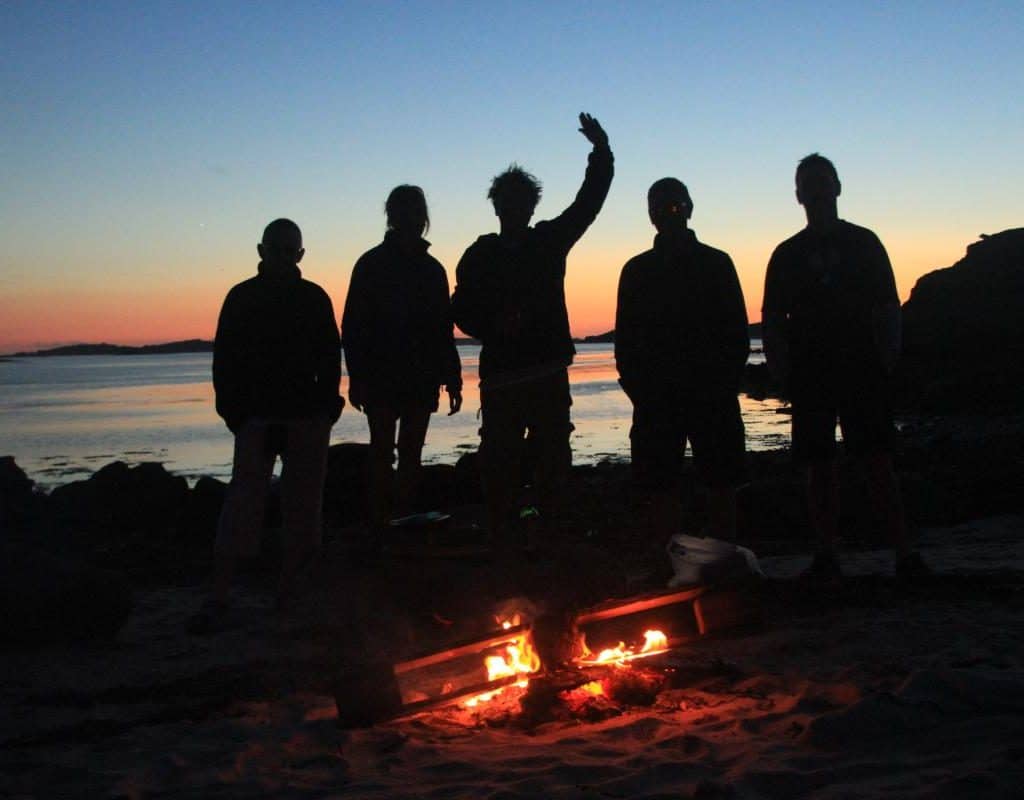
Wild Boy is lively to sail, but very different from a fibreglass dinghy in that she is heavy displacement and therefore has momentum through waves and glides a long way in rivers. Built solidly in wood, with lead ballast and a wide beam, she is a great sea boat in moderate conditions, but she has a large sail area, so the crew need to be active and sit out on the edge of the boat and balance the sail in gusty conditions.
There will always be a professional skipper on board, but he or she will be happy for you to have a go at sailing her as if you are single-handed. She can also carry a lot of kit without compromising her sailing performance so makes a great little expedition boat.
Spritsails were once as common as lug rig for working craft around the British Isles. They enable you to set a lot of sail on short low masts, keeping the centre of effort low and stable.
The mizzen mast and bumpkin out the back allow a small mizzen on a sprit to be hoisted. There is no bowsprit to worry about and the jib can be reefed to make it even smaller. The sailing power comes from a huge mainsail with a 17ft spar that stretches the sail diagonally, a bit like a mini Thames sailing barge. With a ‘brail’ aloft to bundle the sail and pull the sprit vertically into the mast, we can get rid the big sail in the middle of the boat, and have space to row into a small harbour for lunch. Historically the main was brailed away when fishermen were laying pots, and the mizzen kept them head to wind.
There is no boom (wooden spar at the foot of the sail) so you don’t get any violent gybes or tacks, other than watching out for the wooden main sheet block when changing course, which can be easily controlled. There are also reefing points so the mainsail can be made a lot smaller when it is windy. You can also drop the main and sail on jib and mizzen alone.
Wild Boy can be rowed by a single person with a pair of oars to row.
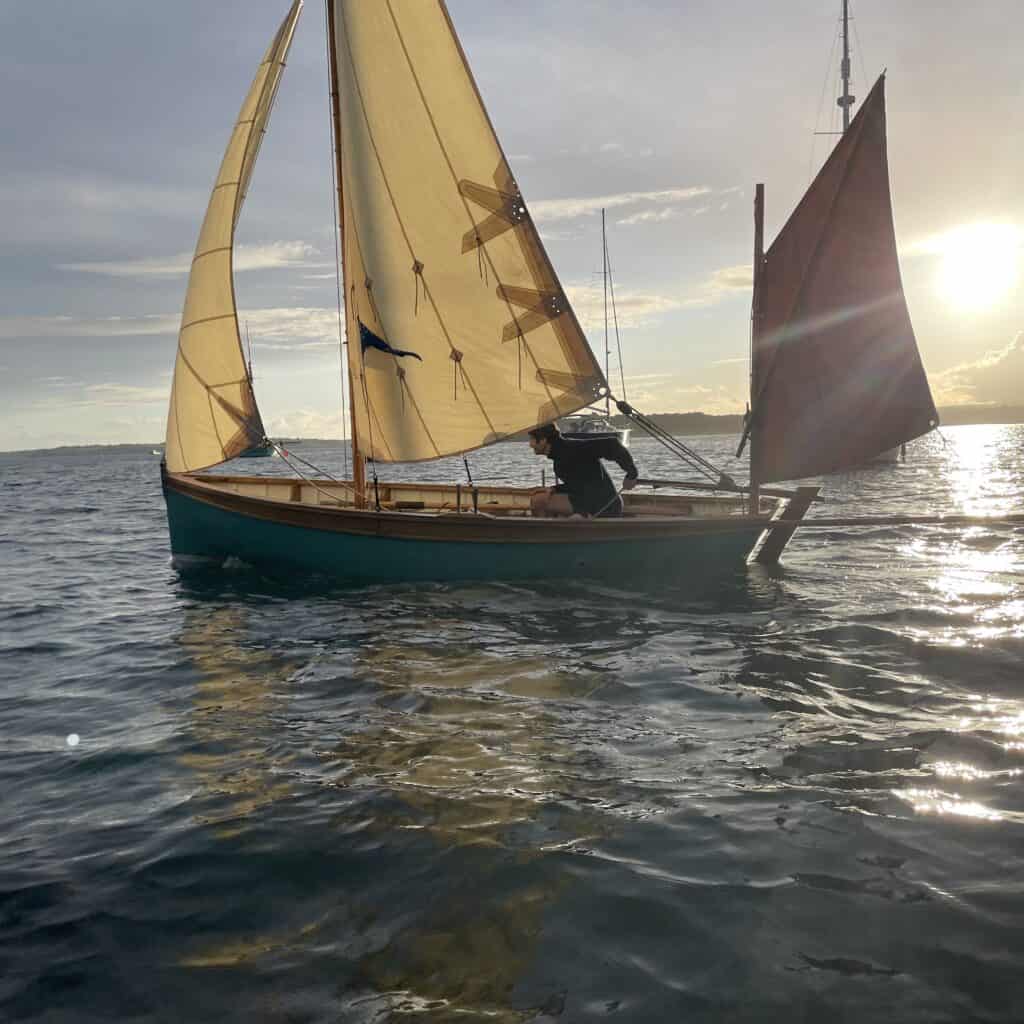
Its all sailing skills, rowing and ‘beachcraft’
Generally, you just take Wild Boy to the shore and jump onto the beach, but the skipper still has to anchor her off the beach. The boat has bow and stern anchors and can set up an outhaul to the shore. this means we can drop an anchor/outhaul as we sail into the beach, step ashore with camping kit and haul the boat back out. Wild Boy weighs 600kg so we won’t be hauling her up and down beaches. We can also tie her Scandinavian style between rocks and trees and anchors. A jetty or quay is best and there are lots of those in Cornwall.
There is a boarding ladder if you want to swim between boat and shore. Stand up paddle boards can be hired too. In autumn/spring the skipper has a dry suit to wade out and collect her, if anchored off. High wellies are useful or sandals and shorts in summer.
Wild Boy does not have a deep keel but without legs she would be at an interesting angle to camp on a beach of hard sand. In soft mud she should settle fairly flat without legs. Whether you cruise with wooden legs is down to space on board. We may take legs in peak season so crews of 3 or less can camp on board with a boom tent. You can then enjoy a quieter night afloat in the shallows and dried out level on legs when the tide goes out. (or that is the theory!)
The intention is to plan and make daily passages, rowing and sailing and adapting to the weather as it happens, come sun, rain, wind or calm. In an open boat, it is unlikely we would choose to sail along a lee shore. The best routes will be to have the wind blowing off the land, so close into the shore we can enjoy flatter seas, and the chance to sail the boat to the beach if we fancy a break ashore. It is an active holiday that is aiming to be fun and get you hooked on small boat sailing, not a survival course.
The Lizard Coast, Helford River and the inland Fal Estuary with numerous creeks is best in SW winds and the Roseland Coast is better in NW or W winds. If the wind is from the East then the St Mawes Bay, Percuil River, St Just creek and inland to the vast Fal river system. Crossing wide open bays in a small boat needs a careful assessment of the weather, akin to a yacht contemplating an offshore passage. Wild Boy will not be operating more than 3 miles out to sea from a nominated home port and carries VHF DSC radio and full safety equipment for a commercially licenced charter boat.
The skipper is not forcing you to stay out in the rain for hours, and Cornwall is not an uninhabited wilderness. If the weather looks set in and miserable, we do what all sensible dinghy and open boat sailor do if everyone is getting a bit too cold and wet: head for a pub or cafe, a shower or a return to base.
We use ‘Wild Country Quasar’ expedition tents which are designed for 2 people to sleep with space for rucksacks too. They are a design that has been around for decades and well tested in strong winds and mountain environments. Olive green and small enough to fit in tiny spaces, they can be erected on sand with minimal tent pegs. 2 people can be accommodated comfortably, with height to sit up once though the entrance. There are dual entrances and each one has a windproof door or a ‘see the view’ – mosquito mesh door option.
Outdoor Girl has 2 Quasar tents for 4 people or smaller groups. The skipper also has a one person bivvie tent and a boom tent for the boat, to add to the range of sleeping options.
The beauty of sail camping is that Wild Boy can carry a lot of gear, so whilst we want you get into the simple life, there is no need to go ultra lightweight. 2.5 inch thick Inflatable camping mats with down insulation are provided for everyone.
We prefer you bring your own sleeping bag, but the company can hire you one for a small charge to cover laundry.
We do provide large 45-50 litre waterproof dry bags for your sleeping bag and clothes. There will be a chance to go through packing for the expedition when you arrive, including test driving whether you can fit all you need in the dry bags provided. If you come by public transport we can store spare kit or clothing ashore at Classic Sailing
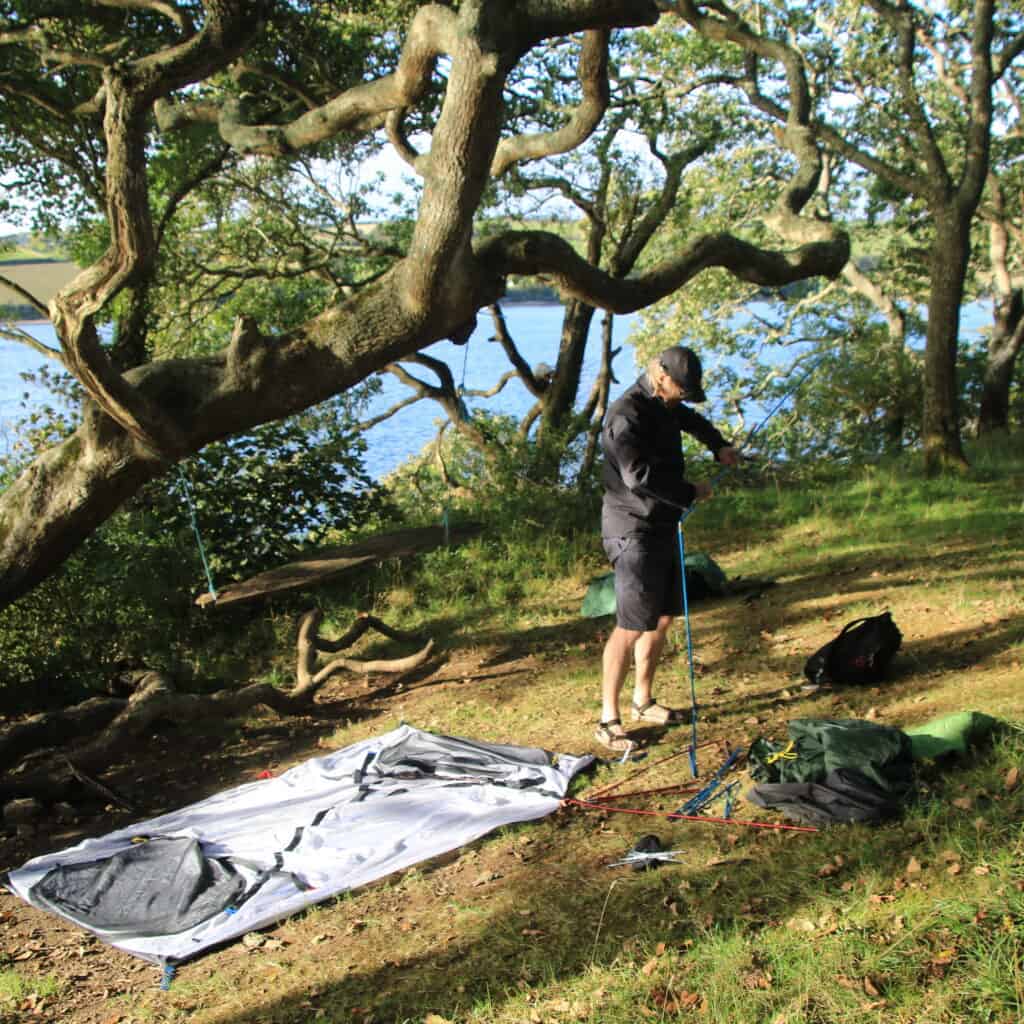
A swim in the sea is the best option for a wash. There are also many springs and streams running down to the sea. They are not suitable for drinking water due to farm animals in the fields, but often ok for a wash.
Like many trekking companies, the handwashing practice we use before cooking and eating is a dry wash with anti-bacterial hand gel.
You are not on a covert operation, so you only have to ask if you are missing modern comforts. Debbie knows many places where a shower or toilet can be found ashore – from marinas, to sailing clubs, campsites and pubs.
Toilets: There are 2 buckets on board. One is a ‘bucket and chuck it’. The other has a lid and contents will be disposed of responsibly ashore. If we are too far away at sea from a landing spot, there will be a code word for – “please all stare at the far horizon whilst I use the bucket.”.
When camping ashore in wild places, there will be a drill to explain how create a toilet and ‘leave no trace’
Each tent will have a hanging light. Wild Boy has a solar-powered battery and anchor light. We recommend you have head torches, but seeing the stars and moonlight is also part of the experience. In the autumn it gets dark early so a row or walk to a waterside inn is quite likely.
Waterline Length 16ft
Beam 5ft
Draught 1ft 3 inch
Wild Boy is a replica of a 19th Century Gorran Haven crabber, and typical of the coastal fishing boats that worked off the rugged shores of South Cornwall. These hardy open boats were launched off the beach and used both sails and oars to lay crab pots close to rocky shores where ocean swells were often running in from the Atlantic. The small mizzen would always stay set, but the big mainsail and 16ft sprit could be bundled up and brailed into the mast when laying or recovering crab pots (creels). When the boat had a full catch or needed to run for port, the big mainsail and jib could be easily set again and provide a fair turn of speed for these shallow draft beach boats.
Built from the lines of a 1882 open sailing boat from the same South Cornwall fishing village. The original 1882 ‘Cuckoo’ was 16ft long on deck with a spar out the stern called a bumpkin. There is also an original Gorran Haven crabber called Ellen ,which is still sailing and owned by the Cornwall Maritime Trust. ‘Ellen’, ‘Outdoor Girl’ and Wild Boy have a similar spritsail yawl rig that was very common all around the British Isles 150 years ago but is rarely seen today, except on much larger Thames sailing barges.
Wild Boy was built by a teanm of boat building students over 18 weeks, as part of our 40 week professional boat building course. She is a wooden boat of carvel construction, with Douglas fir masts. We built her of oak with slow growing Siberian larch for planking.
This is not the full list but will include:
Debbie has been the operations manager and safety director for Classic Sailing for 22 years. Wild Boy and Outdoor Girl are operated y her own independent business ‘Sail Row Explore’, but if you have any queries or suggestions about safety then please ring us or email us via Classic Sailing.
Debbie co-founded Classic Sailing with Adam Purser back in 1997. Our flagship in the early days was 38ft pilot cutter ‘Eve of St Mawes.’ In the 1990’s we both felt there was a lack of traditional vessels offering sailing experiences where exploring ashore was as important as the actual sailing.
As Eve’s skipper for 20 years, Debbie created all sorts of themed voyages that would appeal to non-sailor as much as those who were already in love with sailing. Our secret weapon that had guests come back year after year was an oversized rowing boat called ‘Number 8.’ Debbie used to tow this 16ft expedition boat behind Eve on Cornwall based voyages. She now continues the tradition with 44ft pilot cutter Tallulah.
Without a noisy and potentially dangerous outboard engine, guest crew could take the ship’s boat for a row themselves when Eve was anchored somewhere safe. There there were the whole crew expeditions by rowing boat. All of Eve’s skippers had great fun with ‘Number 8’ but Debbie in particular love to create ‘mini-epics under oar’. Her voyages often involved wading barefoot onto beaches, gliding gracefully up to ancient stone quays and training the crew to ‘toss oars’ gig boat style as they came alongside a waterside pub jetty. And that was just in the daylight. At night there were many small boat rowing adventures that become etched in the memory of guests but the pitch black of a Cornish creek generally ensured there was never any photographic evidence on Instagram or Facebook.
We still have ‘Number 8’, but the beauty of Wild Boyl is she has oars and a substantial amount of sail, so you can venture much further and learn a wider range of seamanship and smuggler style skills.
Debbie learned to cook as a nature conservation volunteer, creating one pot creations for hungry work parties who had been outdoors all day. Next came teaching young people to cook on boats, and then 20 years of being the skipper and cook on Eve of St Mawes with discerning charter guests. Debbie has strong interests in wildlife and the landscape, She has sailed with many marine wildlife guides from Cornwall to the Arctic. She can help you identify birds, trees and tell you about Western Grey Seals, but when it comes to food foraging and survival type skills Debbie will be packing a coolbox with fresh produce from local food suppliers and ‘Mr Sainsbury,’ so you won’t go hungry.
An RYA Yachtmaster Instructor and RYA principal of Classic Sailing, she has taught all levels of cruising skills and shorebased navigation, and loves traditional pilotage. She has also been an outdoor pursuits instructor teaching on keelboats, windsurfing, coasteering, abseiling and single pitch climbing. Another current love is Cornish gig rowing and Debbie races in Roseland Ladies and Supervets crew.
“I freely confess I am a big boat skipper that has recently fallen in love with small boat sailing. In my teens I hated dinghy sailing and preferred windsurfing fast in a wetsuit to soggy shorts in a wayfarer. When our charter boat Eve was sold, I felt a bit lost and was offered the chance to take on the stewardship of 17ft spritsail yawl that needed some love and repairs. In the first summer the grandchildren loved Outdoor Girl, but it was sailing with an ex Royal Marine officer called Jim that made me realise that small boat adventures were perfect for adults too. The wild camping overnight feels a bit rebellious and on the fringes of sensible. Scarily close to nature, requiring planning akin to a military small boat operation, I love the challenge finding the best ways to approach a shore, land whilst keeping kit and people dry, and then anchor Outdoor Girl in a deep, rock free pool or on the beach.
There has never been a better time to remind ourselves of the fundamentals of living – finding shelter, sharing food and stories, travelling without fossil fuels and discovering skills we have almost lost. I’m not Ray Mears or Bear Grylis. I will not be skinning rabbits, but samphire and mussels for the pot I can do. I love camping with a good mattress, but I don’t like backpacking. Why lug a 60 litre rucksack up and down the coast path when you can travel by boat. It won’t always go smoothly but we will have something to talk about round the camp fire” Debbie Purser